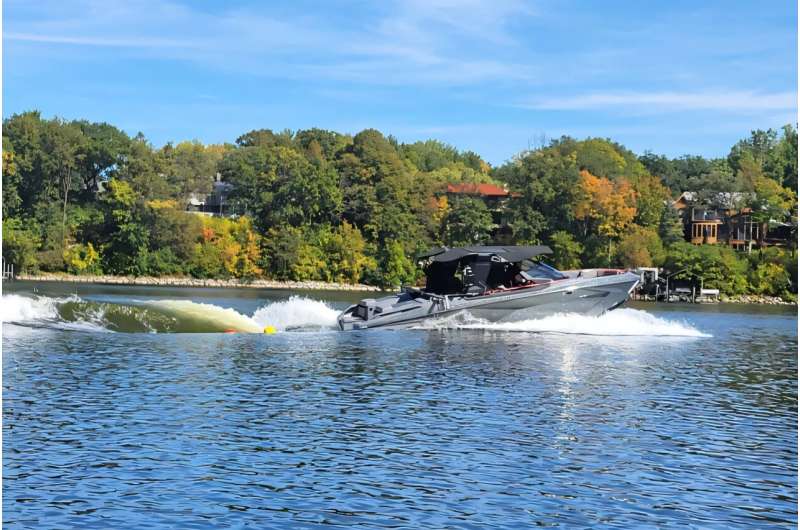Science
Study Reveals Powerboats Disrupt Lake Ecosystems, Urges Caution

Recent research from the University of Minnesota has unveiled alarming insights into how recreational powerboats disrupt the health of lake ecosystems. Conducted over the 2022 and 2023 field seasons, the study employed acoustic sensors to monitor the effects of various powerboat activities on lakebeds, highlighting the significant impact of underwater disturbances.
The research, carried out by a team at the St. Anthony Falls Laboratory, involved the installation of pressure and velocity sensors at two locations and depths within the lake. This innovative approach allowed researchers to gather data on water quality and sediment composition while testing seven commonly used recreational powerboats across different operational settings.
Among the findings, the study indicated that all tested powerboats generate water currents and turbulence capable of disturbing the lakebed. Notably, the turbulence created by wakeboats is more potent, leading to the resuspension of sediments. This resuspension can trigger the release of nutrients such as phosphorus, which may contribute to excessive algal blooms detrimental to lake health.
To mitigate these adverse effects, the researchers recommend that powerboats operate in water depths of at least 10 feet during leisurely cruising or planing modes. For wakeboats engaged in surfing, a minimum depth of 20 feet is advisable. “For all motorized boats, simply being careful about where you steer your boat and avoiding shallow spots can make a huge difference,” explained Jeff Marr, co-author of the study and associate director of engineering and facilities at the laboratory. He emphasized that maintaining a safe distance from shorelines and other boaters is crucial for protecting aquatic environments.
The study’s findings, published in the University Digital Conservancy, underline the importance of responsible boating practices to safeguard lake ecosystems. Fieldwork for the final phase of this research is expected to conclude in fall 2025. This phase will focus on comparing the impacts of wind-driven waves and wake waves produced by recreational boats, further enriching our understanding of lake dynamics.
As outdoor recreation continues to thrive, the research serves as a vital reminder for boaters to prioritize the health of our waterways. By adhering to recommended practices, enthusiasts can enjoy their activities while minimizing ecological disruption. For further details, the complete study can be accessed at the University of Minnesota Digital Conservancy.
-

 Health3 months ago
Health3 months agoNeurologist Warns Excessive Use of Supplements Can Harm Brain
-

 Health3 months ago
Health3 months agoFiona Phillips’ Husband Shares Heartfelt Update on Her Alzheimer’s Journey
-

 Science1 month ago
Science1 month agoBrian Cox Addresses Claims of Alien Probe in 3I/ATLAS Discovery
-

 Science1 month ago
Science1 month agoNASA Investigates Unusual Comet 3I/ATLAS; New Findings Emerge
-

 Science4 weeks ago
Science4 weeks agoScientists Examine 3I/ATLAS: Alien Artifact or Cosmic Oddity?
-

 Entertainment4 months ago
Entertainment4 months agoKerry Katona Discusses Future Baby Plans and Brian McFadden’s Wedding
-

 Science4 weeks ago
Science4 weeks agoNASA Investigates Speedy Object 3I/ATLAS, Sparking Speculation
-

 Entertainment4 months ago
Entertainment4 months agoEmmerdale Faces Tension as Dylan and April’s Lives Hang in the Balance
-

 World3 months ago
World3 months agoCole Palmer’s Cryptic Message to Kobbie Mainoo Following Loan Talks
-

 Science4 weeks ago
Science4 weeks agoNASA Scientists Explore Origins of 3I/ATLAS, a Fast-Moving Visitor
-

 Entertainment4 months ago
Entertainment4 months agoLove Island Star Toni Laite’s Mother Expresses Disappointment Over Coupling Decision
-

 Entertainment3 months ago
Entertainment3 months agoMajor Cast Changes at Coronation Street: Exits and Returns in 2025









